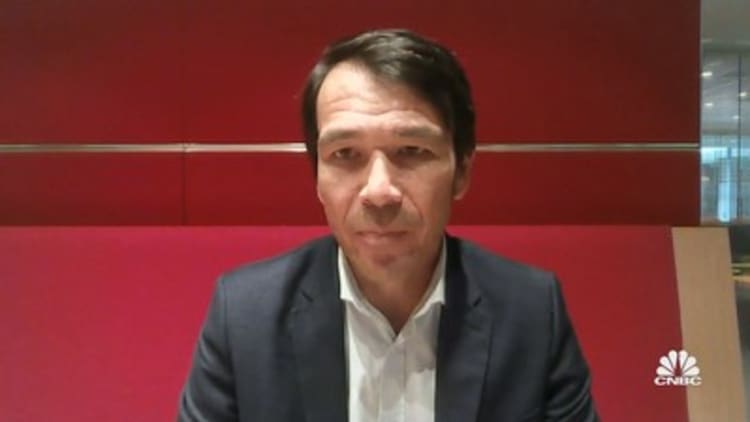The European Central Bank announced Thursday a 75-basis-point interest rate hike — its third consecutive increase this year — while also scaling back support for European banks.
Following much speculation by market participants, the ECB said it was now changing the terms and conditions of its targeted longer-term refinancing operations, or TLTROs. These are a tool that provides European banks with attractive borrowing conditions, designed to incentivize lending to the real economy.
However, because the ECB has been increasing rates faster than expected in the face of soaring inflation, European lenders are benefiting from both TLTROs and higher interest rates. The situation has been described as effectively providing a subsidy to banks.
"During the acute phase of the pandemic, this instrument played a key role in countering downside risks to price stability. Today, in view of the unexpected and extraordinary rise in inflation, it needs to be recalibrated," the ECB said in a statement.
Therefore, it added that the interest rates applicable to the tool, known as TLTRO III, would be adjusted from Nov. 23 to match the deposit facility rate, which is the main benchmark of the ECB. In addition, banks will also be offered voluntary early repayment dates.
"In order to align the remuneration of minimum reserves held by credit institutions with the Eurosystem more closely with money market conditions, the Governing Council decided to set the remuneration of minimum reserves at the ECB's deposit facility rate."
This will see the cost of lending for banks rise significantly under the scheme.
ECB President Christine Lagarde told reporters that the Nov.23 date would allow banks to adjust to the new conditions.
Too early to cut the balance sheet
Market participants had also questioned whether the central bank would be providing details about when it will start reducing its 8.8 trillion euro ($8.8 trillion) balance sheet, in a process known as quantitative tightening.
Lagarde said that the conditions to take this step will be discussed in December, but she added that her team will be looking at three main factors: the inflation outlook, the measures taken so far, and the transmission lag — given that it takes a while for the monetary decision to have an impact on the economy.
The euro weakened against the U.S. dollar in the wake of the announcements from the ECB. The common currency briefly fell below parity before recovering slightly.
European government bond yields also fell following the ECB's decision.
More rates hikes ahead
Thursday's rate hike takes the ECB's main benchmark from 0.75% to 1.5%, a level not seen since 2009 before the sovereign debt crisis. It comes after the central bank rose rates by 50 basis points in July and 75 basis points in September.
However, the ECB confirmed that its rating hike cycle is not yet over.
"With this third major policy rate increase in a row, the Governing Council has made substantial progress in withdrawing monetary policy accommodation. The Governing Council took today's decision, and expects to raise interest rates further, to ensure the timely return of inflation to its 2% medium-term inflation target," the central bank said.

Several economists have projected another rate increase in December of 50 basis points. The ECB, however, did not indicate the level of future rate rises, saying that they will be data-dependent.
Speaking at a news conference, Lagarde said the bank had made "substantial progress" in reducing its accommodative stance, which had been in place since the debt crisis and continued over the pandemic period.
However, she added that this so-called "normalization" process is not finished. "We are not done yet, there is more ground to cover," she said.
It comes as the ECB is dealing with record-high inflation and a slowing economy, with many economists predicting a recession in the region before the end of the year. It's a delicate balance for the central bank, as if it hikes rates aggressively in an effort to deal with inflation, it could cause even more trouble for the wider economy.

"Inflation remains far too high and will stay above the target for an extended period," the ECB also said Thursday.
In September, inflation in the 19-member bloc came in at 9.9%.
Lagarde also acknowledged that the probability of a recession had increased.
When asked about the impact of the ECB's decisions on growth, Lagarde said, "We have to do what we have to do."


